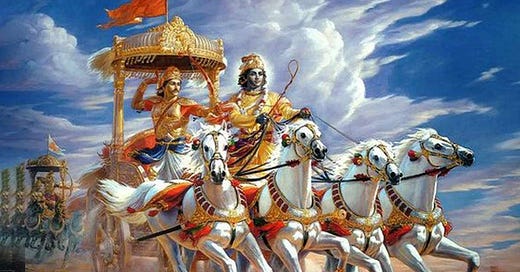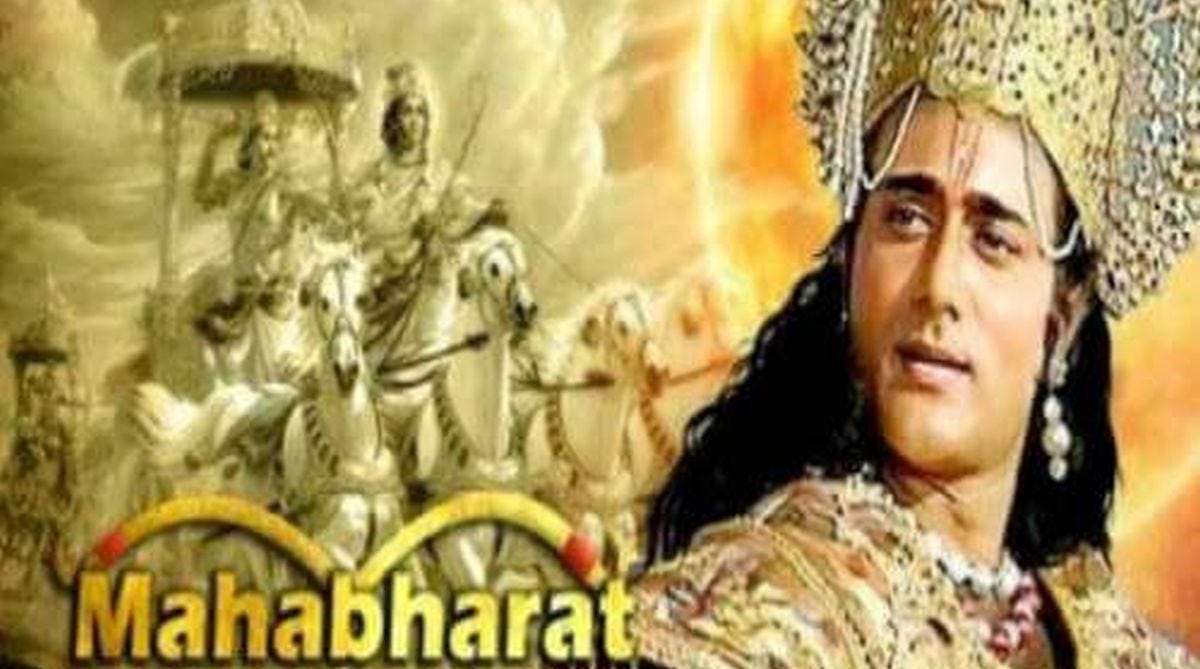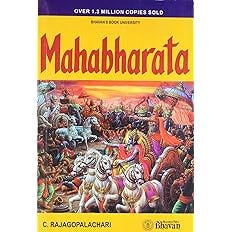"Mystique of Mahabharata: India's Timeless Epic and Its Enduring Wisdom"
Explore the Mahabharata, India's epic tale of dharma, duty, and divinity, as we delve into its rich narrative and timeless lessons for today's world
Introduction
In the last edition, we discussed the epic Ramayana. Today we discuss the epic Mahabharata. In the vast tapestry of human storytelling, few narratives are as captivating, profound, and timeless as that of the Mahabharata. This epic, an integral part of Indian culture and heritage, is a literary marvel that has provided wisdom, moral guidance, and inspiration to countless generations over the centuries. In this edition of "Ancient Wonders", we embark on a journey through the pages of the Mahabharata, exploring its historical context, rich characters, and enduring relevance in today's world.
Origin of Mahabharata
The Mahabharata, often described as the world's longest epic, holds a central place in Hindu mythology and philosophy. Its origins are hidden in the mists of time, making it difficult to ascertain the exact date of composition. However, most scholars believe that it was composed about 5000 years ago.
The epic is traditionally attributed to the sage Vyasa, who is also a central character in the story. It is said that Vyasa dictated the Mahabharata to Lord Ganesha, the elephant-headed god of knowledge and learning, who wrote it. The text is composed in the form of a poem and spans over 110,000 shlokas (verses), divided into 18 parvas (books), each with its own set of stories and teachings.
historical context
To understand Mahabharata, one has to go into its historical context. The epic is set against the backdrop of ancient India, the land of kingdoms, forests, and, sacred rivers. At its core, the Mahabharata tells the story of a dynastic struggle for power and righteousness between two groups of cousins: the Pandavas and the Kauravas.
The Pandavas, led by Yudhishthira, symbolize dharma (righteousness), while the Kauravas, led by Duryodhana, represent adharma (unrighteousness). The conflict between these two families culminates in the great Kurukshetra war, where millions of warriors and heroes, including the mighty Bhishma, Karna, and Arjuna, are pitted against each other.
Bhagwat Gita
One of the most revered and important sections of the Mahabharata is the Bhagavad Gita, often referred to simply as the Gita. It is a philosophical dialogue that takes place on the battlefield just before the battle begins.
In this important conversation, Lord Krishna, who acts as Arjuna's charioteer, imparts profound knowledge and guidance to the conflicted prince.
The Gita explores essential inquiries regarding duty, morality, and the essence of the self. It educates us about the various paths to spiritual attainment, including karma yoga (yoga of action), bhakti yoga (yoga of devotion), and jnana yoga (yoga of knowledge).
The teachings of the Gita continue to serve as a source of inspiration and guidance for individuals seeking clarity and purpose in their lives. If you also wish to understand the hidden knowledge of Shrimad Bhagwat Geeta, then it is recommended to read these books, as many famous persons confirm that after reading Geeta there were positive changes in their lives and their peace of mind.
Mahabharata Characters
The Mahabharata features a wide array of characters, each with their own unique characteristics and moral dilemmas. Here are some of the most prominent celebrities:
Yudhishthira: The eldest of the Pandavas, Yudhishthira is known for his unwavering commitment to dharma and truth, even in the face of extreme adversity.
Yudhishthira, a central character in the Mahabharata, was the eldest of the Pandava brothers. Known for his unwavering commitment to religion, he was a just and wise king who ruled the Kuru Kingdom. Yudhishthira's integrity and moral values earned him respect and admiration throughout his life.
Arjuna: Renowned as one of the greatest archers in history, Arjuna's moral struggle on the battlefield and his subsequent enlightenment in the Bhagavad Gita made him a central figure in the epic. Arjuna was the great warrior of Pandavas in Mahabharata along with Lord Krishna.
He was a unique participant in archery and participated in the dialogue of Bhagavad Gita with Lord Krishna. The story of Arjuna's patience, morality, and warrior skills is an important part of the Mahabharata.
Krishna: An incarnation of Lord Vishnu, Krishna acts as a divine guide and charioteer to Arjuna. His wisdom and divine actions are important to the progression of the story. Lord Krishna is an important character in Mahabharata. He guided the Pandavas and also played many important roles.
Krishna preached the Gita to Arjuna, which detailed important life issues and religious principles. He supported the Pandavas in the Mahabharata war to protect the religion and guided them towards victory. The character of Krishna forms an important part of the Mahabharata and we are reminded of his greatness even today.
Bhishma: A respected elder and warrior, Bhishma's tragic loyalty to his father's vow and his eventual defeat in the battle are both poignant and significant. Bhishma Pitamah was one of the great characters of Mahabharata. His real name was Devavrata, but following his mother's promise, he made his life a celibate and performed great penance.
He supported the Kauravas' side in the Mahabharata war between the Kauravas and the Pandavas and showed complete loyalty to his words. He was honored as 'Pitamah' because he displayed his immense power and knowledge during the war. The sacrifice of Bhishma Pitamah is an important story of Mahabharata, in which he sacrifices his life so that the brave Arjun can get the nectar. His support and piety are one of the important lessons of the Mahabharata.
Draupadi: Draupadi was an important heroine of the epic Mahabharata. She was the daughter of King Drupada and became the wife of the Pandavas. Draupadi is identified as the wife of five husbands, including Yudhishthira, Bhima, Arjuna, Nakula, and Sahadeva. She was famous for her bravery, beauty, and morality.
Draupadi's physical and mental suffering is significant in the Mahabharata when she is humiliated by Dushasana when she is attacked in the Kuru court, but by the grace of Lord Krishna, she is not humiliated. The story of Draupadi's inspiration, courage, and independence reminds us of her important character.
Duryodhana: The main antagonist of the epic, Duryodhana's ambition and arrogance lead to the epic's climactic battle. Duryodhana was one of the important characters of Mahabharata.
He was the prince of the Kaurava dynasty and the son of Dhritarashtra. Duryodhana is known for his disagreements, jealousy, and p, ride. Despite his fair and righteous disputes with the Pandavas, he did not do justice to them and betrayed them many times.
Duryodhana's arrogance and unrighteous behavior due to his ignorance and ignorance became the main reason for the Mahabharata War. Due to his existentialism and weakness, he lost the meaning of his life and ultimately got defeated in the war. His character is the epitome of evil in the Mahabharata and his story teaches us the importance of staying away from unrighteousness.
Karna: A tragic hero, Karna's complex character and unwavering loyalty to Duryodhana raises questions about the nature of virtue and loyalty. Karna was one of the great and prominent characters of Mahabharata.
He was the son of Surya and Kunti, but he spent a large part of his life in exile and became a great warrior along with the Kauravas. Karna had a pious and generous nature and stood by Duryodhana as his friend.
His comrades called him "Ranchhanda" and despite his difficulties, he distinguished himself as a great warrior on the battlefield. The story of Karna is one of the important and thought-provoking characters of the Mahabharata and his story reveals his dedication and his indifference towards religion.
Themes and teachings
The Mahabharata is more than just a grand narrative; It is a treasure trove of wisdom, exploring a wide range of topics and moral lessons that are still relevant today. Some of these include:
Dharma: The concept of dharma, or religious duty, is central to the Mahabharata. The epic raises questions about the complexity of moral choices and the importance of following one's principles.
The concept of religion and religious duty is important to the heroes in the Mahabharata. It shows the complexity of moral choices and the importance of following one's principles a major theme.
This is highlighted in Arjuna's Bhagavad Gita during the war, in which he grapples with his duty and dharma. Mahabharata shows how difficult it can be to make the right decisions in life in matters of religion and righteousness and one must follow it through one's actions.
Consequences of actions: The idea of karma, the law of cause and effect, is a recurring theme. The characters of the Mahabharata grapple with the consequences of their choices and actions. They understand the importance of karma and understand its causes and effects.
The consequences of their actions play an important role in their lives and their choices reveal their ideals. This is part of his indomitable struggle, in which he ponders over the issues of dharma, karma, and morality.
Overall, the characters in the Mahabharata teach spiritual and moral lessons from the consequences of their actions.
Amily and Loyalty: The epic examines the complexities of familial bonds and loyalty, often pitting them against the greater good and moral duty. The epic reveals the conflict between familial bonds and loyalty, with the lead characters often torn between moral duty to their family and loyalty.
They often fall into the dilemma of religion when facing challenges between their family's well-being and their duties. It reveals the difficulties of contemplation and spiritual growth that can separate characters from themselves and their families.
Power and ambition: The Mahabharata highlights the corrupting effects of power and ambition, presenting cautionary tales of uncontrolled desires. The Mahabharata reveals the influence of power and ambition, which can lead to conflict and destruction as a result of uncontrolled desires.
These stories present us with a rich tapestry of tales. Mahabharata is an example of the diversity and unity of Indian culture. The diversity of language, religion, and culture has been presented together in this epic.
Religious elements have an important place here, but customs, traditions, and values are also mentioned in it. The diversity of Indian society is presented meaningfully in Mahabharata, from which we learn that despite supporting different elements, there is the importance of unity and goodwill.
Relevance in the modern world
Despite its ancient origins, the Mahabharata remains highly relevant in today's world. Its teachings continue to provide valuable insights into morality, ethics, and the human condition. Here are some of the ways in which the epic maintains its importance:
Conflict resolution: There is an important message of conflict and resolution in Mahabharata. This poem teaches us that problems can be solved through dialogue and compromise rather than violence.
Before the war, Arjuna consulted Krishna in the Bhagavad Gita to remove his darkness and find solutions to his problems with his guidance. This teaches us that the right way to resolve disputes is peaceful. Compromise and dialogue to achieve consensus instead of conflict pave the way for peace and harmony in our society.
Leadership and Governance: The characters of the Mahabharata teach about leadership, governance, and the responsibilities of rulers. Pandavas and Kauravas give proof of their leadership towards the war. After the war, they respect the war victims and practice religion.
It teaches that rulers should be responsible for the welfare of the society. Arjuna gives important lessons on governance in the Bhagavad Gita, which explains the importance of pious and generous leadership. This provides us with an understanding of the important role of leadership and governance, which is vital for prosperity and justice.
Cultural Heritage: Mahabharata is an important part of Indian cultural heritage. This epic story contains important lessons about religion, karma, morality, and human values. The characters of Mahabharata, such as Arjuna, Yudhishthira, and Shri Krishna, teach us important aspects of life.
Its reading strengthens our cultural sentiments towards restraint, courage, and justice. The message of Mahabharata is still important in building our society and it has been an important part of our cultural heritage.
Resources To Watch And Read Mahabharata
There are many resources available today to watch and read Mahabharata:
Mahabharat Serials: BR Chopra's "Mahabharat" serial was aired on Indian television and is still made available to the audience even today. This serial presents the story of Mahabharata in a very detailed and outlined manner. You can watch it in the Hindi language on YouTube. There are many more serials that you can watch online.
Mahabharata Books: There are many different Mahabharata books and works of commentators available, with translations and lectures. You can get books available in your language. Here are some books that you can buy
Online Websites and Apps: Many online platforms and apps also provide the narrative of Mahabharata, with Mahabharata texts, lectures, and other resources available in different languages.
You can select these resources based on your interest and convenience so that you can understand the story and essential messages of Mahabharata.
Conclusion
The Mahabharata stands as a great literary achievement, a spiritual guide, and a storehouse of knowledge beyond time and boundaries. Its complex story, memorable characters, and deep philosophical teachings continue to fascinate and inspire people around the world.
As we explore this ancient wonder, we find not only a gripping story of epic proportions but also a timeless source of guidance and reflection for our own lives.
We will also discuss other things related to the characters of Mahabharata in the next edition. How did you like this version, if you have any comments, questions, or ideas, please let us know. And if you liked this version, then please give your opinion, like, and share it with your friends and family. And stay with us. Thank you






